Truth telling
Oral history archive

The Centre for Popular Memory’s vast sonic archive is an extraordinary repository of over 3 000 oral history interviews, featuring first-person life histories, testimonies, memories and shared reflections in nine languages. Several of its key collections are now available online – with full transcripts and translations.
The Centre for Popular Memory (CPM) was an oral history-based, research, advocacy and archival centre located in Historical Studies at the University of Cape Town, but independently funded. The centre was committed to recording and disseminating peoples' stories to expand the democratizing possibilities of public history.
In the late 1980s, Shamil Jeppie, who was then a young researcher in Historical Studies, conducted interviews with District Six residents around forced removals, and this formed the basis of the Western Cape Oral History Project (WCOHP), which later became the CPM. At that stage the unit’s mandate was broadened. Whereas the WCOHP focused purely on oral history research, the CPM undertook research, training, dissemination and archiving.
When I joined in 2001, there were about 600 audiotapes and by the time the centre closed down in 2013 there were over 3 000 hours of audio and about 400 hours of video. The subject matter also broadened out to cover arts, communities, environment, education, perceived identities, life histories, migrancy and refugees, politics, trauma and memory, and work.
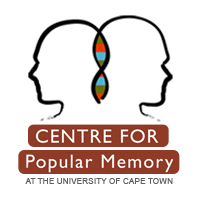


‘The CPM’s activitites were based on the belief that people's stories have the power to contribute to social and developmental change. As we hear, see, imagine and empathise with others, we can contribute to altering attitudes, perceptions and policy.’
When we started the CPM, there was a surge of interest in ‘voice’. It wasn’t long after South Africa’s first democratic elections in 1994 and there was a lot of interest in community voices, struggle voices, multi-facetted versions of history and a focus on oral history as a research methodology. The centre’s activities were based on the belief that people's stories have the power to contribute to social and developmental change. As we hear, see, imagine and empathise with others, we can contribute to altering attitudes, perceptions and policy.
The Centre's research prioritised multi-lingual and multi-disciplinary approaches to memory, narrative, gender, identity formation, and the impact of violence and traumatic legacies in Africa. We specialised in dissemination of these narratives through books, radio, exhibitions, film and web.
Some of the CPM’s major research projects include:
- Forced removals to Atlantis and Mamre (80 interviews, English/Afrikaans transcribed and translated)
- Langa heritage (56 interviews, English/Xhosa transcribed and translated)
- Popular culture in Cape Town (60 interviews, English, Xhosa transcribed and translated)
- Congolese and Nigerian Migration (110 interviews, English, French, Lingala transcribed and translated)
- Trauma and Memory in Guguletu (32 interviews, Xhosa transcribed and translated)
- Mediation of trauma in different communities (46 interviews English transcribed)
- Forced removals from Ndabeni and Blouvlei (60 interviews English, Xhosa transcribed and translated)
- Street Stories (400 interviews English, Afrikaans, Xhosa)
- Performing Stories (90 interviews Xhosa, Zulu, Sotho, Tswana, English)
Until fairly recently though, none of these projects had been digitised, so before its closure at the end of 2013, the CPM undertook a major digitisation drive. The CPM mainly housed analogue audiotapes and a tape’s optimum lifespan is only about 25 years. So we started with the 200 District Six recordings from the late 1980s, which were beyond their optimum use-by date and not being stored in optimal conditions. In conjunction with this (although separately funded), we digitised the accompanying hand-typed transcripts, which are also now available online on the Digital Collections website.
These posters formed part of the Centre for Popular Memory’s tenth anniversary exhibition, We Remember, which was launched in tandem with the Centre’s archive holdings catalogue, which lists and describes the Centre's entire audio archive of over 3 000 hours of interviews (divided into 10 holding collections). The exhibition was opened by Alessandro Portelli from the University of Rome, one of the world’s boldest proponents of oral history. The aim of the exhibition was to ‘visualise’ the archive and its provenance by combining interviewee images with details and quotes from related interviews.
We also digitised all the other recordings in the Communities collection, which focuses on the experiences of communities, which were forcibly removed under apartheid.
The following year, we digitised key collections in the Environment and Politics holding collections. In addition to their accompanying transcripts, all the digitised recordings are accompanied by metadata, which means that they can be easily searched for and found online. We also created a physical and online catalogue for researchers, so that they can easily locate what they’re looking for in these collections.
We get a lot of research requests from people ranging from filmmakers to authors researching aspects of South African social history. For example, some filmmakers recently inquired around material relating to the Ochberg orphans. In 1921, Isaac Ochberg, representative of the South African Jewish Community, travelled to Poland and the Ukraine and brought back with him to Cape Town 167 ‘Russian, Ukraine and Polish War and Pogrom Orphans’ plus 14 ‘attendants and nurses’, mainly older siblings. Half of the children were placed in the care of the Cape Jewish Orphanage (later Orania) and half went to Johannesburg, under the care of the South African Jewish Orphanage (later Arcadia).
The documentary entitled Feiga's Choice deals with the anti-Jewish pogroms of 1917-1920. The film explores how a forgotten piece of Jewish history reverberated through the generations as told through one family's story. Their window into this time period is a rare, first-hand memoir written by a Jewish mother of 12 who sent two of her children to South Africa with the Ochberg Orphans. While the filmmakers are aware the subject was part of the Ochberg's Orphans documentary, their understanding is that Feiga's Choice will be the first documentary to explore the pogroms. They have drawn on the CPM’s digitised recordings for their research and have included these audio interviews in the film.
‘We encourage researchers to listen to the audio recordings rather than just reading the transcripts because there’s incredible value in actually listening to somebody’s voice – there’s a lot that comes through that you just don’t get in a text.’
UCT Special Collections holds the archival material relating to this story, and we also have some life history interviews in the CPM holdings, which include a lot of immigration life histories. So the filmmakers were able to gain access to direct source material via the CPM archive.
Some crucial ethical considerations governed all the work that we put online. When it comes to audio, copyright legally resides with the person who created the recording (the interviewer), but ethically, we would never use that material unless we had copyright release from the interviewee. In our work at the CPM, we made sure that we had copyright agreements with every person that we interviewed, and at that stage the person being interviewed would stipulate the terms on which their story could be shared. They would say whether they gave permission for it to be used for research purposes, for print publication or for it to be available on the Internet. The work that we digitised had to have copyright release.
The CPM interviews that we have digitised and transcribed were conducted according to oral history research methodology, so they are not just chats – they are very content rich. That was the honour of working at the Centre: there is something important in every interview. Everybody has a story to tell and every person’s story has deep value.
We encourage researchers to listen to the audio recordings rather than just reading the transcripts because there’s incredible value in actually listening to somebody’s voice – there’s a lot that comes through that you just don’t get in a text. When you’re reading a transcript, you don’t hear the pauses or intonations. You don’t experience the emotion or vocal intensity with which the person is speaking. The themes that we focused on at the Centre were all quite emotive – trauma and memory were at the core of our work.


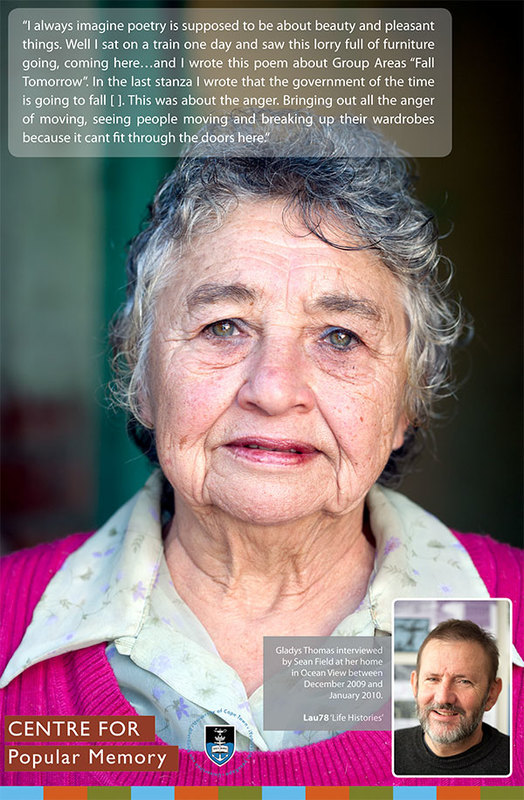
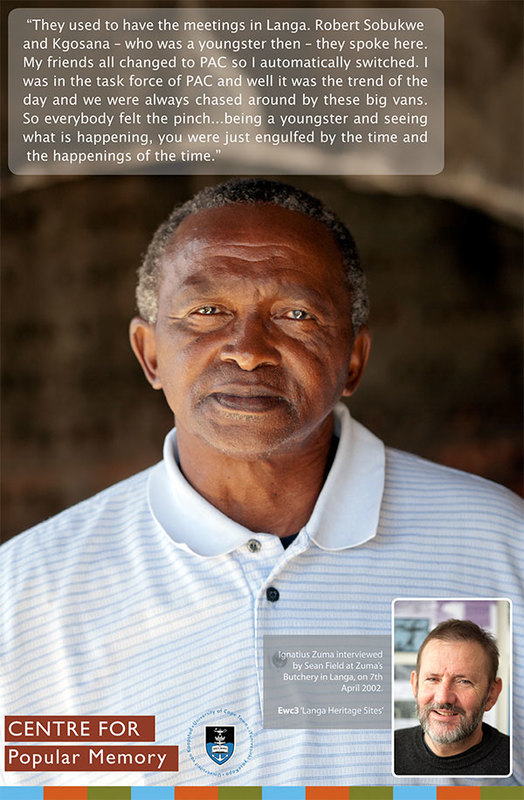
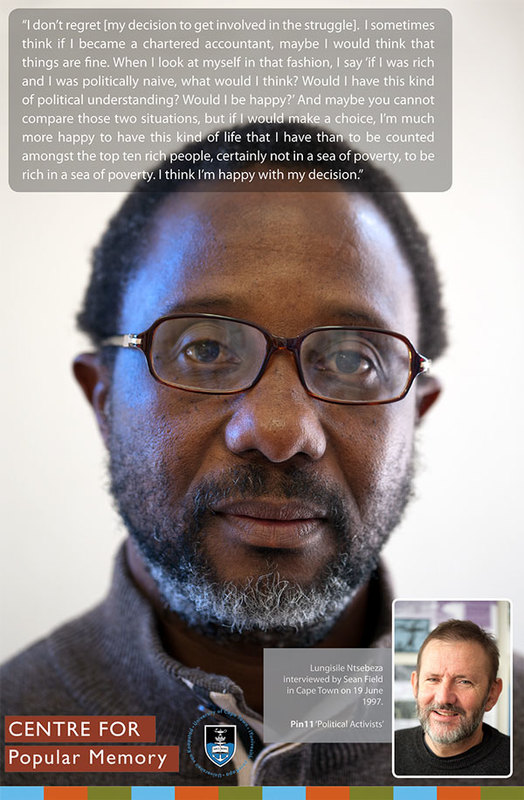
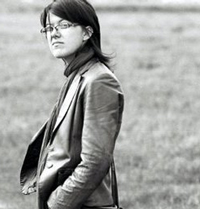 Renate Meyer is Head of Special Collections at UCT, and former co- director of the Centre for Popular Memory, which was committed to gathering, archiving and disseminating local oral histories. Having qualified as a fine artist and worked in museology and curatorship, she was particularly interested in how such multifaceted life stories could be gathered ethically, curated intelligently and accessed dynamically. The Centre’s multi-lingual projects directly addressed these interests, resulting in numerous exciting, research-rich outputs of local and international interest.
Renate Meyer is Head of Special Collections at UCT, and former co- director of the Centre for Popular Memory, which was committed to gathering, archiving and disseminating local oral histories. Having qualified as a fine artist and worked in museology and curatorship, she was particularly interested in how such multifaceted life stories could be gathered ethically, curated intelligently and accessed dynamically. The Centre’s multi-lingual projects directly addressed these interests, resulting in numerous exciting, research-rich outputs of local and international interest.